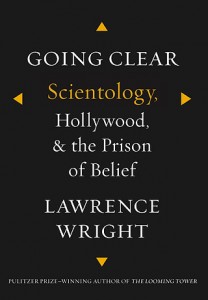 Hey, kids, welcome to summer camp! This is supposed to be a time when things slow down, but we’re more slammed than ever — and we have big stories coming, we promise.
Hey, kids, welcome to summer camp! This is supposed to be a time when things slow down, but we’re more slammed than ever — and we have big stories coming, we promise.
But today, we thought we’d latch on to the seasonal fun over at the Dallas Morning News, where the editorial board decided that for the dog days of summer, they’d read Lawrence Wright’s 2013 book about Scientology, Going Clear. (Here’s our piece back when the book first came out.)
Today’s discussion over at the DMN is a question that we usually avoid here, because it tends to send people in circles. The newspaper asks, “What makes a religion a religion, and should Scientology qualify?”
We were intrigued to see that the person who launches the discussion is editorial board member Keven Willey. Back when we toiled in the journalistic salt mines in Phoenix, Willey was a columnist and then editorial board member of the Arizona Republic, and while we often disagreed with her point of view, we always had a healthy respect for her analytical powers.
We thought you might like to see how she handled today’s question, and offer your own points of view. Might even give you a good excuse to get Larry’s book out and read it again while you’re spending time at the beach.
Here’s Willey’s piece…
Reading this book makes me realize how difficult it is to define what qualifies as a religion and what doesn’t. I want to say that Scientology doesn’t qualify, for reasons ranging from the immense financial benefits that accrue to the leader to the physical and emotional debasement of those subjected to the Hole and RPF.
But taking a 60,000-foot view, I realize that those characteristics aren’t really that different than how other religions operate, or at least operated in their early years. So my personal repulsion isn’t a good indicator of religion-cult differentiation.
Reflecting on the book, I’m really not surprised by Scientology’s initial allure. The promise of self improvement, of learning to better control one’s emotional balance and physical being, of attaining a higher spiritual understanding is very alluring. And the structure of “coursework” and escalation of earned status is reassuring in its logic and progression.
But what astounds me is that so many otherwise smart and talented people stay with Scientology after learning of its habitual hypocrisy and abuse. What sort of “higher spirituality” depends hypocrisy and abuse? And who would want to be associated with it – especially in this day and age, when information from a wide diversity of sources is so readily available?
I’m thinking of hypocrisy and abuse mainly in three ways.
First, the personal enrichment and obscene materialist excessiveness exhibited by Ron Hubbard and David Miscavige — on the backs of Sea Orgs. Living in such grandeur while others not only didn’t but didn’t even really have much of a pathway to financial betterment seems ruthless, hypocritical and abusive.
I guess many Scientologists didn’t or don’t realize the life of excess that Miscavige enjoys. But that requires a willful ignorance that seems hard to believe in this Information Age.
The there’s the personal degradation that so many members experience in the Hole or RPF, sentences that can last for years for minor or subjective infractions and penalties that are greater than the U.S. penal system.
The running in circles in triple-digit heat, the cleaning of a bathroom floor by tongue, the going years without seeing sunlight, etc. Unbelievable. Why would anybody after being subjected to such punishment, or knowing somebody who had, return to a “religion” that promulgates it? Willingly, no less.
And then there’s the total dependency. For a religion that preaches self confidence and sustainability — I admire the taking responsibility coda — the dependence that the Scientology structure imposes on its members (especially those in Sea Org) seems odd, irrational.
It is these factors that most mystify me about Scientology’s ability to retain a membership, and its ability in this day and ago to be regarded as a religion.
Keven asks some good questions. We’d especially like to see some responses from former members.
——————–
Posted by Tony Ortega on July 14, 2014 at 08:30
E-mail your tips and story ideas to tonyo94@gmail.com or follow us on Twitter. We post behind-the-scenes updates at our Facebook author page. Here at the Bunker we try to have a post up every morning at 7 AM Eastern (Noon GMT), and on some days we post an afternoon story at around 2 PM. After every new story we send out an alert to our e-mail list and our FB page.
Learn about Scientology with our numerous series with experts…
BLOGGING DIANETICS (We read Scientology’s founding text) 1, 2, 3, 4, 5, 6, 7, 8, 9, 10, 11, 12, 13, 14, 15, 16, 17, 18, 19, 20, 21, 22, 23, 24, 25
UP THE BRIDGE (Claire Headley and Bruce Hines train us as Scientologists) 1, 2, 3, 4, 5, 6, 7, 8, 9, 10, 11, 12, 13, 14, 15, 16, 17, 18, 19, 20, 21, 22, 23, 24, 25, 26, 27, 28, 29, 30, 31, 32, 33, 34, 35, 36, 37, 38, 39, 40, 41, 42, 43, 44, 45, 46, 47
GETTING OUR ETHICS IN (Jefferson Hawkins explains Scientology’s system of justice) 1, 2, 3, 4, 5, 6, 7, 8, 9, 10, 11, 12, 13, 14
SCIENTOLOGY MYTHBUSTING (Historian Jon Atack discusses key Scientology concepts) 1, 2, 3, 4, 5, 6, 7, 8, 9, 10, 11, 12, 13, 14, 15, 16, 17, 18, 19, 20, 21, 22, 23, 24, 25, 26, 27, 28, 29, 30, 31, 32, 33, 34, 35, 36, 37, 38, 39, 40, 41, 42, 43
PZ Myers reads L. Ron Hubbard’s “A History of Man” | Scientology’s Master Spies | Scientology’s Private Dancer






